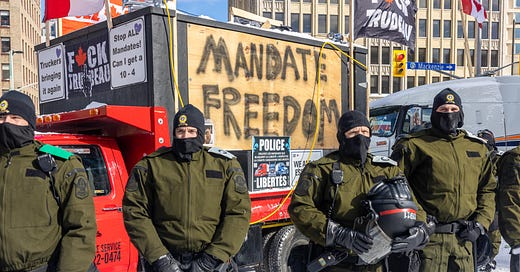Weekend reads: Inquiry's opening shots
Some initial thoughts on the Public Order Emergency Commission
Like many Canadians, I spent a number of hours this week watching the Public Order Emergency Commission — which has, just two days into its proceedings, already complicated the dominant narrative on the trucker protests.
The Commission has established that the protests were noisy, chaotic, and deeply inconvenient for some residents. Roughly fifteen thousand downtown Ottawa residents lived with a set of circumstances that included loud truck horns, fumes, disorderly crowds, and congested streets.
I don’t doubt, hearing testimony, that it was difficult at times to work, sleep, and move around the city.
As the Canadian Civil Liberties Association noted in a statement on Friday, the impacts of the protest were serious. However, as it also pointed out:
…the testimony did not shed light on why ordinary policing powers were insufficient to address them or why the federal government declared a national emergency.
The impact on Ottawa residents and Ottawa businesses does not explain why a public order emergency was declared affecting the entire country. Nor does it explain why the orders were written in a vague and broad manner that aimed to stifle freedom of expression and assembly …
Based on today’s testimony our assessment that the government acted unlawfully and unconstitutionally has not changed.
I have to agree that nothing I have heard so far comes close to meeting the standard for invoking the act, which law professor and Lean Out guest Ryan Alford outlined in his opening statement to the Commission. (Video here, at the 2:09:00 mark.)
As Andrew Coyne also pointed out in The Globe and Mail, the bar for invoking the Emergencies Act is extremely high:
The onus will be on the government, indeed, to show that what it knew was sufficient in law to justify invoking the act. The bar is set extraordinarily high – again, by the terms of the act itself. It requires the existence, for starters, of “threats to the security of Canada” that are “so serious as to be a national emergency.”
A “national emergency” means an “urgent and critical situation” that “seriously endangers” the “lives, health or safety of Canadians” to an extent that exceeds “the capacity or authority of a province to deal with it” or “seriously threatens” the “sovereignty, security and territorial integrity of Canada” and – crucially – which “cannot be effectively dealt with under any other law of Canada.”
“Threats to the security of Canada” takes a whole section of the Canadian Security Intelligence Service Act to define: It includes “espionage or sabotage” or “foreign influenced activities” of a clandestine nature that are “detrimental to the interest of Canada;” or “the threat or use of acts of serious violence against persons or property” for a “political religious or ideological imperative;” or “undermining by covert unlawful acts,” or “the destruction or overthrow by violence of,” Canada’s system of government.
The government has to show all of these things. Even if it can show there was a “national emergency” involving “threats to the security of Canada,” it has to show that this could not have been dealt with other than by the powers conferred by the act.
I’m going to go out on a limb and suggest that the “microaggressions” that Ottawa city councillor Mathieu Fleury referred to in his testimony do not meet that standard.

Nor does what we heard from other witnesses about people feeling unsafe, or “trapped,” or “shaken,” or “abandoned,” or “traumatized.”
Nor does mischief meet that standard.
Nor, even, would serious criminal matters normally handled by police.
Add to that, as Jon Ivison wrote in The National Post this week: “Concerns about the economy are serious, but they don’t justify the circumvention of Parliament or the executive arm of government ruling by fiat.”
I’ll be writing more on the hearings in coming days and weeks.
But for now, we should all keep this legal bar in mind as we watch the events at the Commission unfold.





While I completely understand the chaos this caused for the residents of Ottawa the entire situation could have been stopped or shortened dramatically by the Liberal government simply addessing and meeting with Canadians that had the right to peacfully protest. The lies and media coverage of this protest was disgusting to say the least. The Emergencies Act was not only extereme but unconsitutional and the exact meaning of Authoritarianism. Since 2015 this government has trampled on our civili liberties and committed a handful of ethics violations. Yet here we are....7 years later. What will it take to remove this government?
Looking forward to your continued coverage Tara!